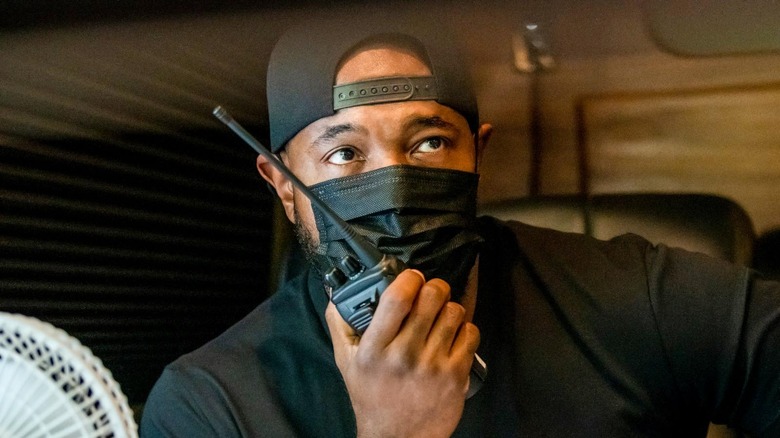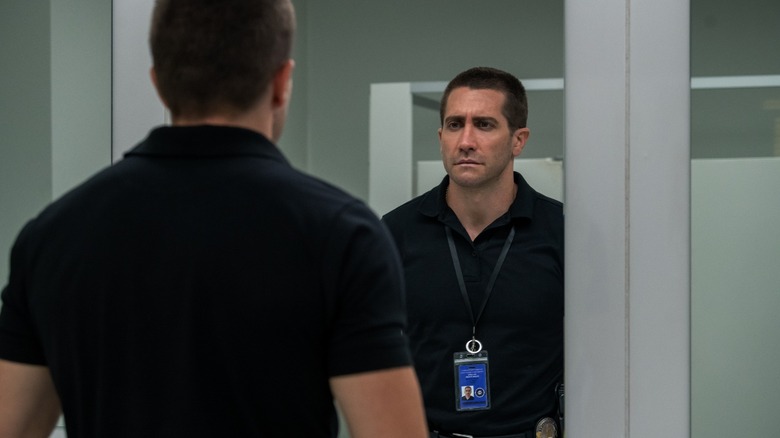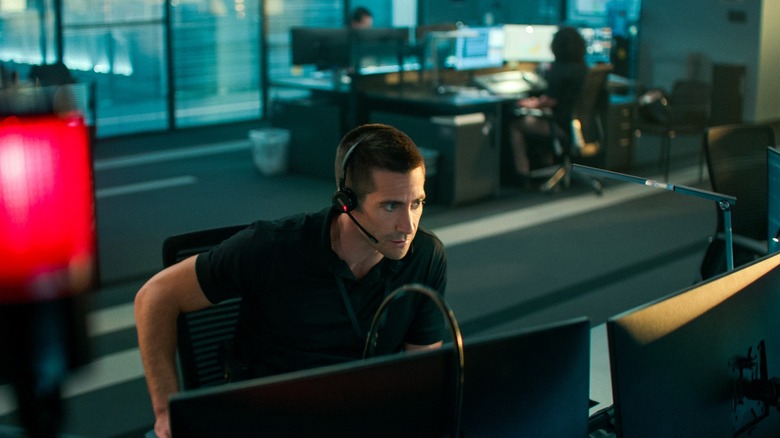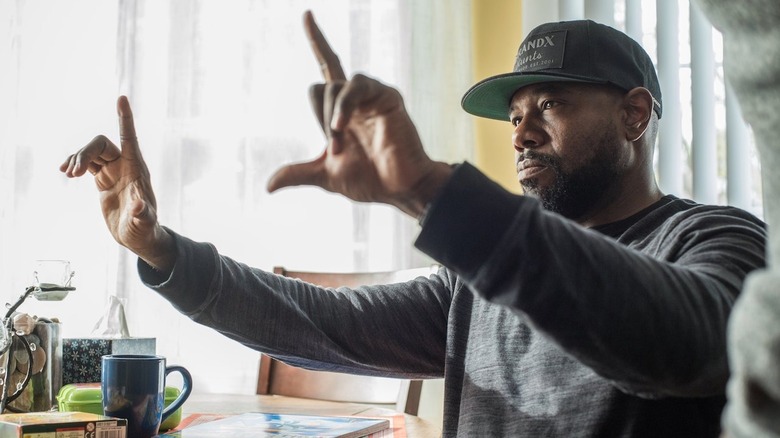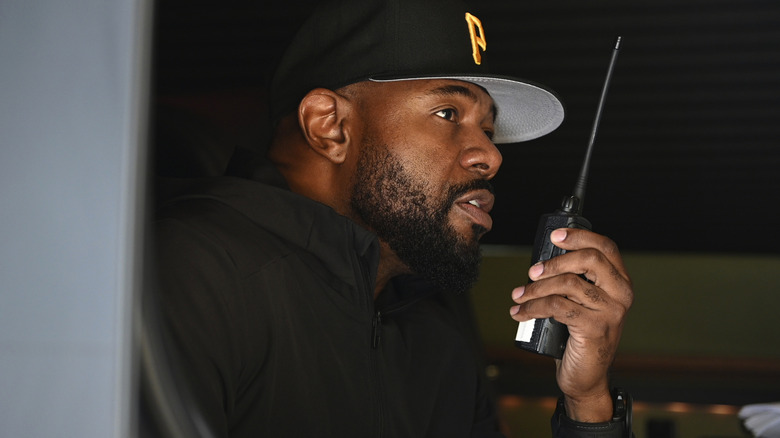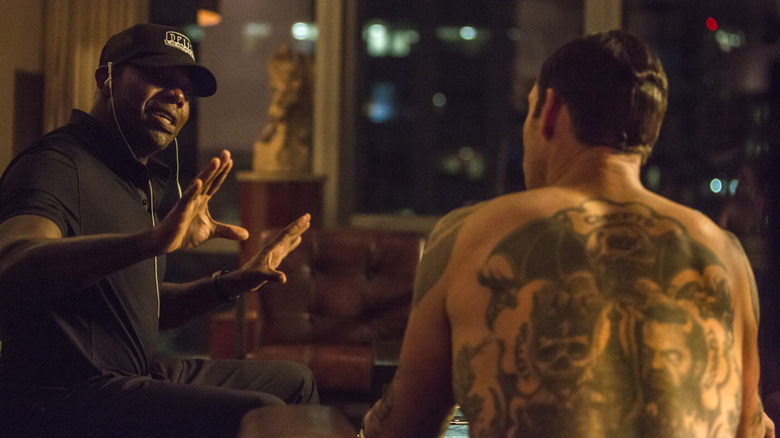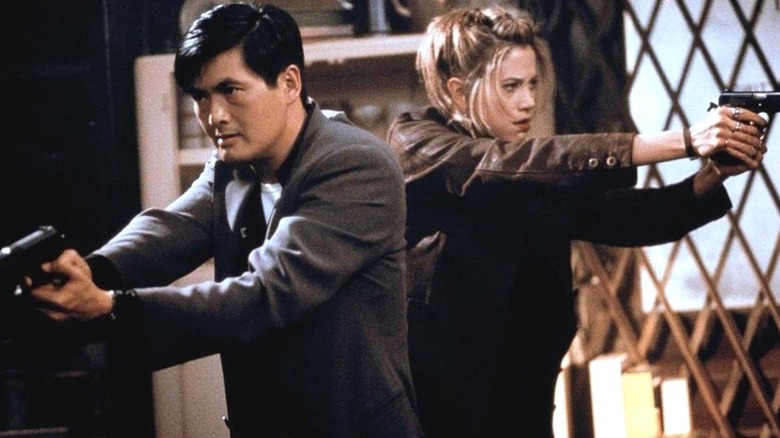The Guilty Director Antoine Fuqua On The Great Adventure Of Filmmaking [Interview]
Antoine Fuqua shoots for the big screen. He makes crowd-pleasers. Those experiences, especially "The Equalizer" films, are elevated by the audience. This year, though, two of Fuqua's movies will be seen by most audiences on the small screen. "Infinite" was released on Paramount+, which was a decision the director didn't appear fond of, and his latest film, "The Guilty," received a limited release before its upcoming debut on Netflix.
Fuqua is adjusting.
With "The Guilty," he's made his tightest and most intimate thriller to date. The camera is almost always in a 911 Call Center and focused on Jake Gyllenhaal, who plays a cop assigned to the call center for reasons revealed later in Nic Pizzolatto's ("True Detective") script. Fuqua shot the film in 11 days and during the pandemic. Recently, the director behind "Training Day" and several iconic music videos told us how he pulled it off.
'There are no old, wise men.'
This is the most contained movie you've made. How was that experience?
It was a challenge, but it was fun, man. It's always daunting to do that. It was the height of COVID, so that matters. But creatively, I care about actors anyway. I really love the magic that happens. And the great actors, there's something in their eyes. There's something that happens that you can only see when you're here. Jake is one of them.
When I read the script I thought, "Okay, it's limited, it's tight. How do you maintain an audience's interest? The idea of people hearing great actors' voices and not knowing, not seeing, creating their own scenario of the events that happen was fun. You never know if it's going to work or not, but the challenge of allowing the audience to fill the blanks was really interesting, man. That's what I got excited about.
Making the actor the spectacle, basically.
Absolutely, making the actor the spectacle, the emotions. Why is he behaving that way? Not telling you everything up front, letting you discover things along the way. I actually learned that from Sidney Lumet before he passed away. He talked to me a lot about that. I remember he said, "They like to listen." He came in to see me one day and he goes, "Let the audience just go with the guy. He is who he is, whether they like him or don't like him. That's your character."
A lot of directors revisit his book on making movies. Do you?
Oh, absolutely. You learn from the masters, you go back and see. What the masters will tell you is that there are no old, wise men. They'll tell you that they're probably even wrong. What you'll learn from them is follow your instincts at times and also be open and be willing to move. When you find the actors that you know that bring their A-game and they're going to do their job – Jake, Ethan Hawke, Denzel Washington – you trust each other. You have to trust each other. It's where the magic starts to happen.
Be willing to bob and weave a bit, like music. Like I said, music, if there's a rhythm and all of a sudden somebody starts to go a little off, can you flow with that? Is that better? It's happening while you're making the music, like a movie. That's the magic of it all and part of what I love the most, to put an actor at the tip of the sphere and then go on the journey together, and be willing to not predict everything.
'Every film has something that you have to deal with.'
Shooting in such a contained environment, did you feel more control?
Yeah, you have more control obviously with weather and things like that. But then it has its own issues. Every film has something that you have to deal with. In this case, there's more control. When you have more control then you have to be more responsible, obviously, with the time and your shots. You should do it in every movie, but limited budgets means you have to be very precise.
A film like this where you're dealing with COVID and you're dealing with a certain amount of space, real estate, you got to be very precise. It's dealing with sound, and the people calling in, you have to be very precise because you have to bring emotion with voices over the phone. You don't have time to keep going back, do another take, "Try this this way." You got to get it because you also want to keep people safe. We shot it in 11 days.
So when you say you got it, you better be sure you got it. Like every film, you do your homework. You get prepared, you do it. And then you gotta be willing to make quick decisions. On the location, it's a different deal. It's different but the same. Right now, I'm making a movie, "Emancipation," with Will Smith in Louisiana. I'm dealing with heat, COVID, hurricane, alligators, you name it. So that's part of filmmaking, it's the great adventure and you never know what's going to happen.
How do you deal with alligators?
You don't. You let them do what they're doing and hopefully there's a wrangler that can get them away. Yeah, you don't [Laughs]
11 days is fast, but with your background in commercials and especially music videos, where artists will often arrive on set hours late...
Or not at all. They may not show up at all.
[Laughs] Does that background help with a film shoot as short as 11 days?
The background certainly helps. It's not as daunting to me because I'm used to that urgency, that pacing. Sometimes when you hire people that have only done movies they're looking at you like you're nuts. Because you're saying, "Let's go. Put that light there, let's do this here and let's go," where you're aggressive with it because you know that lens is going to work, that light is going to work.
You know what you're going to get because you've done that in commercials or in videos. At least on the basic level, not at the storytelling level but on the basic, visual level your eye develops quickly in that world. You know sometimes what you might be able to get away with or not.
Doing videos and stuff back then, if you know a shot is going to last on the screen for 10 seconds or 5 seconds, or 5 frames, you know what you need, really. So you can say, "I just need one light. It's going to be on the screen that long," and, "Get it and let's go. As long as the performance is right, get it and let's go. I don't want them lit, I want the silhouette," because you've done that. You get to understand the power of images and how quickly people pick it up.
'You always go back to the masters.'
Akira Kurosawa has always been a major influence for you. Given the contained environment and the stakes involved, how much did you think about the first hour of "High and Low" when you were making "The Guilty"
Exactly. It's a detective story, ultimately. Again, you go back to the masters. You always go back to the masters. Filmmaking is interesting, all this crazy technology we got and shooting digital, and all this cool stuff. If you really look at filmmaking, though, it goes back to basics. You still got to get a performance. You still got to tell the story. You still have to tell the audience where you are in geography. How you do it is up to you, but it goes all the way back to the way they made films like "The Great Train Robbery." The basic storytelling is the same. Sometimes we all get lost in technology and all the cool toys, but that doesn't always mean it's going to be better.
Do you enjoy that, too? You've made bigger movies like "King Arthur" and "Infinite," where you get to play with those toys.
I do, I do. They're fun. How can you not? You're just a kid in a sandbox. You get to try some stuff, some drones, some lenses, all that stuff. But then sometimes it becomes a little bit of too much of that and not enough about the things I care about personally. The balance is trying to find something that gives you the money and the freedom to make these big, fun, temporal movies, but get a story that's actually about something or a character that you still care about. I think people like James Cameron or Spielberg, they've found a way to do that and execute that in a big, commercial way. I'm still playing around with that.
Of course, "Infinite" went to Paramount Plus+, plus "The Guilty" is for Netflix. How do you feel about that change?
I'm adjusting. I'm adjusting because that's the world we live in. Just like when I started out doing music videos and I started out doing commercials, the pacing changes. You just adjust as an artist. I still love the big screen, no doubt, but I also love the fact that you can go on streaming on Netflix and you can see it around the world immediately. They put it up on the big screen as well.
I think we're at a place where we can get our cake and eat it, too. Netflix gives you the freedom to make the movie. They're filmmaker-friendly, that's what they do. If you can get it up on the big screen, even better. That'll help as well. I think we're in a place where we have to embrace it all, we do. When Jeffrey Katzenberg was doing Quibi, me and Jeffrey, we have to embrace it all. So that's how I feel about it.
I have one more question about Kurosawa for you. Since you're such a fan of his, with "The Magnificent Seven," how did you want to stay true to him as a filmmaker?
Bullies. I think that's what it was. It's funny you asked me that because I'm always thinking about that. The first time I saw that movie I related to it, the poor people that are being mistreated and taken advantage of. We all wish we had a samurai that's going to come along and save the day. We always wish we're going to have the Magnificent Seven around on their horses and come in and save the day. I think me being on the poor people's side of things, I related to those characters of wanting outside help. I think that's what I care so much about when it comes to "Seven Samurai."
One of the greatest examples of what a hero can be, too. The leader of the gang is kind and gentle, not playing tough.
Not at all. Not at all. He is a very humble man, a spiritual man, actually. Yeah, and when you look at "Equalizer," same sort of character.
Please, make seven of those movies.
[Laughs] Oh, man. We'll see, man. We're talking about doing another one now. It's funny because it all goes back to that. It does, it just goes back to those films that I love.
'I don't even look at my movies.'
You're one of those directors, when you see, "Antoine Fuqua Film," that means something. I know what that means. For you, what does that mean?
I don't know, whatever it means to you. Even if you don't enjoy the entire film but you're seeing what I'm trying to say, I appreciate that. Because I'm learning and growing, too, as a human being and as an artist. So I go back to saying things sometimes because I care so much about them. I'm still trying to grow and learn and see what I could do better. Maybe I didn't hit that note right. Another opportunity may come in a different package, maybe I could hit that note. I'm constantly growing. I think it's more important what an Antoine Fuqua film means to you than it is to me, because it's hard to look at. I don't even look at my movies.
They are for the audience.
That's what it's for, because I'm the kid that loves movies. I love movies. So literally, when I watch my first cut I get popcorn and coke. I don't drink soda any other time, but I watch the movie in the theater and I just sit and eat popcorn and drink coke like a regular person. And then I take notes, that's it.
You work with one of the few actors that makes you want to go to a movie on opening day, Denzel Washington.
Absolutely.
And get popcorn and a coke, like you said.
That's right. I learned some of that from him, from D. "Yeah, man, let's have some popcorn and coke and sit down and watch the rough cut." He would sit and watch the rough cut by himself in the theater. I'm nervous, like, "All right, I'm going to show you the first cut..." He would go in the theater by himself, no one else around, and he would just get some popcorn and coke and watch the movie.
He's a great filmmaker, too. How does he approach acting with a filmmaker's eye?
It's just trust. Denzel, Jake, Ethan and any of the guys, it's trust. Whatever they see in me I'm grateful and humbled by it because they trust me, and I trust them. But that's the key element, trust. They know I'm going to protect them. They're going to bring their A-game, and they know I'm going to take what they give me and go into my editing bay with my editor and I'm going to shape that. Without that you really don't have much, without that trust.
They know I have a vision in my head. They know there's always some metaphor somewhere, I got something else I want to say. We don't talk about it. It comes out in interviews. Denzel will go, "That's the movie you were making in your head?" I'm like, "Yeah, man." Same thing with Jake on "The Guilty," I'll see him sit there and go, "Hmm," like he didn't know. I told Jake, with "The Guilty," I said, "That's 'Dante's Inferno,' he's dying." That's what that journey is. Sometimes it comes out in these interviews because I have all my notes but we don't discuss everything sometimes.
'The human being is the most complex thing.'
With "The Guilty," like some of your other films, you really like to let mirrors show duality.
[Laughs] That's funny. Yeah, you picked up on that. Yeah, man, someone else brought that up to me, maybe it was Ethan. It's just something that comes out of you as you design it. When you read the script, you start to see it. And then somehow, I'll do things and you'll bring it up. And I'm going, "I didn't realize I did that," or someone else will bring it up that I've repeated myself or touch on something again.
I had dinner with someone and they said, "Man, I love the spirituality in your movies," but I don't know if everybody picks that up or not. He went right to "Training Day" and he was like, "Oh, the crosses, the telephone poles." Now that's very intentional, but some people may just see old telephone poles with the sun setting behind it, but that had meaning to me. Even in Roger's (Scott Glenn) house the windows are like that, as are the cross on his neck.
There are things I play around with, the good and evil. It just comes out, sometimes it's not even intentional. There's a church in "Magnificent Seven" where they burn down the church and that's where it all starts, that sort of thing. As an artist it just starts to ooze out, and I don't really realize it until you guys bring it up.
That must be fun though, right?
Yeah, it's fun then I go back and look at it. I'm going, like, "All right, I need another theme."
Well, don't some people say artists always tell the same story at the end of the day?
Always, man. You can go back, you can read the Bible, it's always the same story that's always being told. We were talking about this today, people have done Shakespeare over and over and over, different actors, different directors in theater. People have done August Wilson different ways in plays. There are only so many human emotions. You can come up with cool ways of doing it or other worlds to put it in. But even the big Marvel movies ultimately come down to human beings, behavior, and good and evil.
So, not to simplify anything but the human being is the most complex thing. That's why on "The Guilty," filming Jake, it's the most complex thing, the human being. We still don't even know much about what makes us tick, what's wrong with us, how our brain really works, what to do with all these feelings. We hide everything, we put on these outfits and act like we're a certain way and then you're by yourself, miserable. You know what I mean? So putting a camera on a human being, an actor that can convey real emotions, true emotions, wherever they come from, that is the most interesting thing no matter what.
"Training Day" is a good example of that, too. It's mostly just two guys talking in a car.
That's it. It's just two guys in a car. That's what it's about, their rhythm, what's going on, their human behavior, Ethan's response to Denzel, Denzel's response to Ethan. Without that, you don't have anything. In this case, Jake, without those other actors, they make his performance better as well because they're doing a lot of work, too. And you don't even see them, you just hear them, which tells you a lot.
'You don't have the power you think you have.'
You're one of the rare filmmakers who successfully transitioned from music videos to filmmaking. How was your first experience making a movie, "The Replacement Killers," and what do you attribute your longevity to?
It's hard to say what it is. I love movies. I've always loved movies. I was blessed to be able to do music videos and commercials as a way in. I was writing ideas and reading books I was getting the rights to, but no one would ever let me make them back then. It's probably good they didn't because I've grown and may have made a huge mistake.
"The Replacement Killers" was a good and bad experience. It was great because Chow Yun-Fat is the coolest guy in the world. He was just beautiful. Mira Sorvino was cool. It was fun working with Mira. She had just won an Academy Award, so it was intimidating. But the difficult thing was learning the studio system, learning all the things that go along with that system.
I grew up watching Scorsese movies and Francis Ford Coppola and everybody. And you hear these stories about how, "They made their movie this way." Then, you get into a studio system and you realize sometimes that you're not going to get a dolly. That's not the way it works. You don't have the power you think you have to make the movie your way.
There are a lot of people that have a lot of say, especially when you're that young in the studio world. You learn that it is a business. I think for me, what I learned was I still love making movies, and I know what I don't want to do. The thing that I learned the most out of that movie was what I don't want to do.
Mr. Fuqua, thank you for your time.
Be well, man. Keep enjoying the movies.
"The Guilty" will release Friday, October 1 on Netflix.
